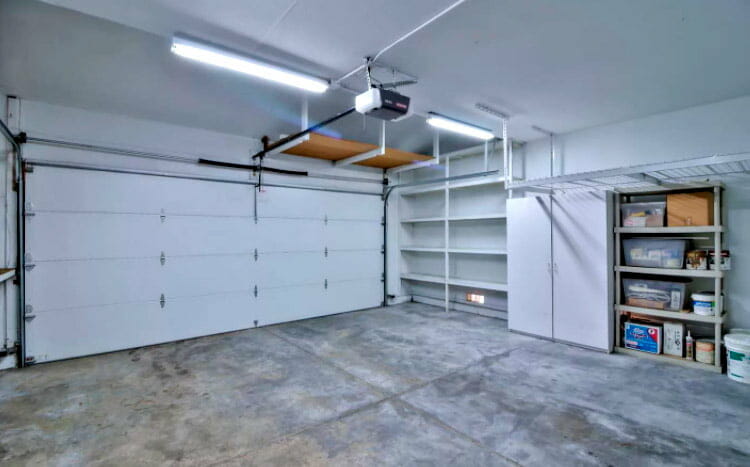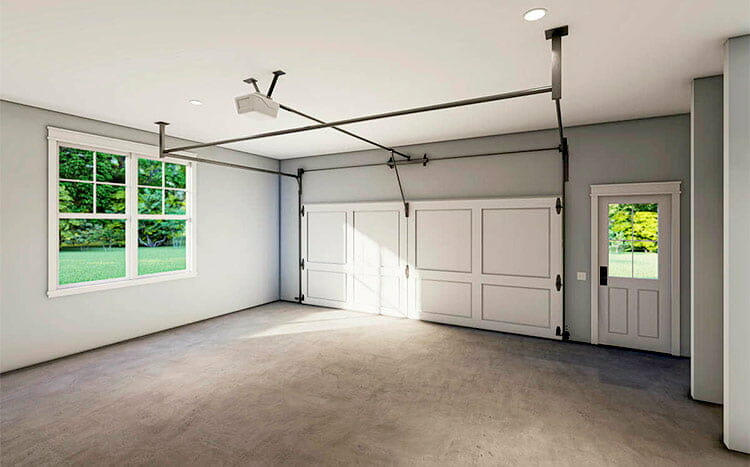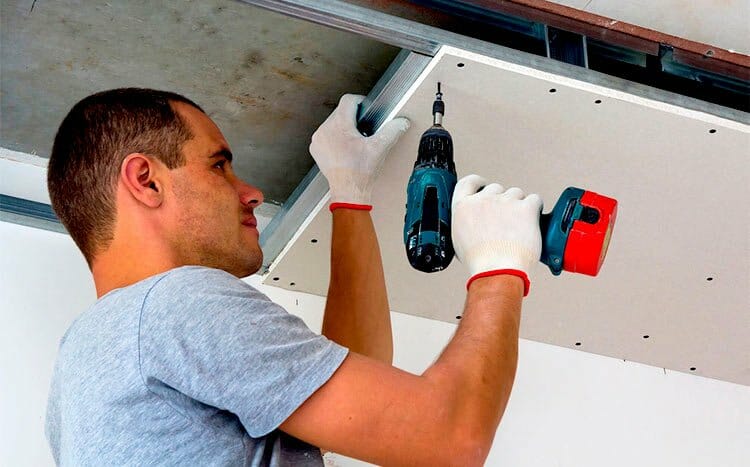Transform your garage by adding drywall to increase its flexibility. This improvement helps you get rid of your garage’s unsightly look and infuse it with vibrant, more attractive colors.
The average cost to drywall a garage is $2,113. The real range is $700 to $5,000, depending on the size of the garage. There are several factors that influence how much you’ll spend on a garage drywalling project.
Here’s a breakdown of the costs you should expect for this project.
What we cover
ToggleAverage Cost to Drywall a Grange
Even though garages can be larger than some rooms in the house, your average cost to drywall is usually cheaper since it doesn’t need special finishing or any special materials.
The average cost of materials and supplies for the job ranges from $0.50 to $0.75 per square foot. If you’re hiring an expert, labor costs will range from $1 – $3 per square foot or between $50 to $90 if they bill by the hour.
| Services | Quantity | Low | High |
|---|---|---|---|
| Drywall a Garage | Per sq. ft. | $1 | $3 |
| Garage Drywalling labor | Per hour | $35 | $100 |
| Drywall a 1 car Garage | 14’ x 22’ | $616 | $1,848 |
| Drywall a 2 car Garage | 24’ x 24’ | $1,056 | $3,168 |
| Drywall a 3 car Garage | 34’ x 22’ | $1,500 | $4,488 |
| Drywall job supplies | Avg | $0.50 | $0.75 |
Average Estimate: $2,113
Cost to drywall a 1 car garage
The average cost to drywall a 1 car garage ranges between $1232 – $2,464 inclusive of insulation price. The cost of the standard drywall alone ranges from $616 to $1,848 per panel. Different contractors may charge you slightly higher for this.
If you choose to use Type X or fire-resistant drywall, the cost per drywall panel is between $680 – $2,000 depending on rating. Including the insulation costs, you’ll spend anywhere from $1,355 – $2,700.
For homes that need moisture-resistant drywall, the cost using standard drywall panel starts from $740 – $2,957. When you include insulation costs, your overall costs will add up to $1,500 – $3,400.

Cost to drywall a 2-car garage
A 2-car garage is the most popular size in the country. The cost to drywall a 24 x 24 garage is around $2,112 – $4,224 including insulation. Regular uninsulated drywall panels for the same space will cost you anywhere from $1,056 to $3,168.
If you’re using fire-resistant drywall, the costs could be higher, between $1,160 – $3,500 using drywall panels and between $2,323 – $4,646, inclusive of garage insulation.
Moisture-resistant drywall will cost you between $1,300 to $3,800 using drywall panel, and between $2,534 – $5,068 if you also insulate the garage.
Cost to drywall a 3-car garage
3-car garages are the average for big homes with many vehicles. The average cost to drywall such a space, including the insulation, ranges from $3,000 – $4750. Standard drywall panels required for this garage will cost you between $1,500 and $4,488.
Homeowners using fire-resistant drywall will spend more, with the drywall panels going for $1,650 – $5,000 If there’s need to insulate the garage, the overall costs will stand between $3,300 – $5,225.
The average costs for a moisture-resistant drywall panel costs between $1,800 – $5,400. Insulation costs for such a big room is high, and it’ll cost anywhere from $3,600 – $5,700.
Garage Drywall Cost Comparison by Type
The costs below indicate the average costs for different drywall types based on the 2-car garage, which is the most common in the country.
| Cost Component | Low | Average | High |
|---|---|---|---|
| Cost | $1500 | $2,920 | $4,340 |
| Drywall type | Standard | Moisture resistant | Fire-resistant |
| Thickness | 1 x 3/8" | 1 x 3/8" | 2 x 1/2" |
| Garage Size | Single 14’ x 22’ | Single 14’ x 22’ | Single 14’ x 22’ |
| Insulation | No | No | No |
| Batten installation | Yes | Yes | Yes |
| Ceiling height | 8 feet | 8 feet | 8 feet |
Cost to Drywall and Insulate a Garage
| Service | Quantity | Standard | w/ Insulation |
|---|---|---|---|
| Drywall a 1 Car Garage | 14’ x 22’ | $1,232 | $1,848 |
| Drywall a 2 car Garage | 24’ x 22’ | $2,112 | $3,168 |
| Drywall a 3 car Garage | 34’ x 22' | $3,000 | $4,488 |
The size of a garage determines how many cars can fit and how much drywalling and insulating will cost. A 14′ X 22′ garage is one of the smallest sizes available. It fits only 1 car, and the drywall installation (with insulation) costs anywhere from $1848. Standard drywall for this garage costs $1,232.
The 24’ X 24’ size garage fits around 2.5 vehicles. The cost to drywall and insulate a garage this size is about $3,168. Without insulation, the cost of standard drywall is around $2,112.
The largest common garage size is the 34’ X 22′, which can fit around 3 vehicles. Drywalling such a garage with insulation costs anywhere from $4,488. The cost of standard drywall for this garage stands at $3,000.
Cost to Fire-resistant Drywall a Garage
| Service | Quantity | Standard | w/ Insulation |
|---|---|---|---|
| Fire-proof Drywall 1 Car Garage | 14’ x 22’ | $1,356 | $2,000 |
| Fire-proof Drywall a 2 car Garage | 24’ x 22’ | $2,323 | $3,380 |
| Fire-proof Drywall a 3 car Garage | 34’ x 22' | $3,300 | $4,796 |
The Fire-proof drywall is one of the most expensive drywalls in the market. For a small one-car garage, drywalling it with insulation costs $2,000 while the average drywall panel costs about $1,356.
A two-car garage will cost you around $3,380, inclusive of the fire-proof drywall installation and insulation. Standard panel of the drywall for this garage will cost $2,323.
A 34′ X 22′ 3-car-garage is the most expensive. Installing it with insulation stands at around $4,796, while the standard drywall costs about $3,300.
Cost to Moisture-resistant Drywall a Garage
| Service | Quantity | Standard | w/ Insulation |
|---|---|---|---|
| Moisture-resistant Drywall 1 Car Garage | 14’ x 22’ | $1,500 | $2,116 |
| Moisture-resistant Drywall 2 car Garage | 24’ x 22’ | $2,550 | $3,606 |
| Moisture-resistant Drywall 3 car Garage | 34’ x 22' | $3,600 | $5,000 |
Most moisture-resistant drywall is usually around 20% more expensive than the standard drywall. A panel of drywall for a 1 car garage costs homeowners around $1,500. If you include insulation, the total drywalling costs will stand at $2,116.
Using this drywall for a 2-car-garage will cost you around $2,550 for drywall panels. Installing these boards of drywall alongside insulation will cost you $3,606.
For the 3-car-garage, installing this drywall with insulation will cost around $5,000, while standard drywall panels will cost around $3,600.
Cost considerations for garage drywall

Drywall types
There are numerous types of drywall available in the market. The most popular include Fire-resistant (Type X), moisture-resistant, eco-friendly, etc. Drywall also differs in size and thickness.
These differences mean that your overall costs will depend on the type of drywall you choose. You’re likely to pay up to 50% more for thicker and larger drywalls.
Total costs will also be higher if you opt for moisture-resistant and fire-resistant drywalls over the standard drywall.
Ceiling height
Installing drywall on high ceilings is usually more expensive because the hanging and finishing process is difficult. You’ll spend more to drywall a 12-foot ceiling compared to an 8-foot-high ceiling.
Experts may also have to use lightweight drywall for the tall ceilings, which will add to the costs.
Insulation
The average cost of insulating your garage varies depending on your garage’s size and the type of insulation you choose. Most homes add batt insulation which could cost you between $0.70 – $1.50 for materials and installation.
Garage shape
It’s cheaper to drywall a plain 4-corner garage compared to one with windows, and ceiling cutouts. Garages with abnormal shapes like arches and curves will cost you about 50% more to drywall. This is because the job is simpler and doesn’t take much effort.
Finishing
There are six types of finishes for your garage, ranging from level 0 to level 5. Each level refers to the quality of finishing, with level 0 having the lowest (unfinished) quality and level 5 having the most textured (smooth) finishing.
The better the quality of finishing you expect, the more you’ll spend. Level 5 finishing demands more paint and materials to give the ultimate finish, making it the most costly finish.
Attached or Detached Garage
Your garage drywalling costs will be higher if the garage is attached to other rooms in your house. You’ll need to consider fire-resistant drywall, which is more expensive than other drywall, to improve your home’s safety.
If the garage is detached from your home, you’ll need moisture-resistant drywall, which costs about 20% more than regular drywall.
Laws and permits
While drywalling your garage won’t cause serious structural changes to your home, you’ll have to seek guidance from your state’s planning and building department concerning any laws governing fire-ratings and environmental impacts.
In cities like Gaithersburg, Maryland, you’ll need a permit for any alterations to your garage drywall.
You may spend anywhere from $30 to $500 to receive the necessary permits for the job.
Professional Drywaller Vs. DIY cost
If you choose to drywall your garage as a DIY, your costs might be considerably lower than hiring a pro. This is because you’ll save around 70% of the labor costs you’d have spent on a professional drywaller.
| Low | High | |
|---|---|---|
| Professional Cost | $700 | $5,000 |
| DIY cost | $308 | $561 |
DIY cost
For the DIY project, material costs will range from $0.50 to $0.75, but it could be higher depending on the finish you’re going for. However, you also have to factor in the cost of your time as you’ll spend hours on it.
Materials needed
- 12 sheets of 4’ x 8’ drywall (3/8 inch) – $150
- 18 packs of insulation – $1,152
- Drywall screws – $6
- Joint tape – $13
- Joint compound (mud) – $16
- Safety glasses – $30
- Mask – $20
- Paint – $30 (A gallon)
- Primer – $15 (A gallon)
- Corner trowel – $13
- Sand paper – $12
- Jab saw – $10
- Utility knife – $13
Professional drywall service cost
Most professional drywall contractors will charge you from $50 to $100 an hour, even for the smallest drywall repair jobs. Their costs are quite high because they also factor in their overhead costs in your total price.
They’ll also charge extra for services like drywall removal, repairs, and disposal.
Pros can, take advantage of their partnerships in the industry to get you the materials for the project at a far cheaper price.
You’re also likely to get good deals from contractors if you have multiple rooms that need drywall beside the garage.
3 Drywall alternatives for finishing a garage
Drywall is a popular and reliable material to use on your garage wall. However, it easily cracks, breaks, or dents which is more common on garage walls, as they are exposed to more abuse than other interior walls.
Drywall also performs poorly when exposed to water and easily attracts mold. If you’re not such a big drywall fan, here are the three best alternatives for your garage wall.
Plywood sheathing
Plywood is one of the toughest materials you can use for your garage finishing. It’s very easy and quick to work with, and its strength allows it to last longer than drywall. However, it’s more expensive and less fire-resistant than drywall.
Cement board panels
Cement board panels are an amazing material if your garage is prone to heavy moisture or water damage. The panels are moisture-resistant and also work perfectly against mold and mildew.
It also comes in numerous colors, which makes it very appealing. Cement board panels are also non-combustible, making them perfect for fire-resistance.
Pegboard
Pegboard isn’t always your first thought as an alternative for drywall, but it offers so much convenience. The material comes in metal and wood, and it can be easily be attached to your walls with a nail or screw. You can also try a movable hanger to provide extra space for hanging your tools.
FAQ's
Is it worth finishing a garage?
Yes! Even though finishing your garage may not increase your home’s value, it won’t hurt it either.
A finished garage is a pretty subjective factor, and it could be the key decisive factor for some homebuyers. Other buyers may give two hoots about it, but you’re better off not taking that chance.
Do I need to insulate a garage?
It depends on how you’re using it. If you spend a lot of time in the garage, whether working on your vehicle or for washing activities, you’ll want to improve its comfortability. Insulating is a good idea for such cases.
If you want to insulate the garage to cut down your power bills, insulation may not be the best way. You can also avoid insulating if you only use your garage for storing your vehicle.
Does drywalling a garage add value?
Yes. Drywall gives your garage a nice fresh look which appeals to many homebuyers. It also gives it some sound-proof features and good fire-resistance, which gives the new owners flexibility on how they can use it.
However, its impact on your total resale value may not be as big as you’d expect.














